As California reopens from pandemic, Bay Area residents describe life changes
Masks off at the gym
California reopens and people in Pleasanton took off their masks at the gym. James Torrez reports
OAKLAND, Calif. - Today marks the day that California reopens after state leaders have declared it's OK to eliminate many of the restrictions that upended public life since March 2020.
Though some of the pandemic safety measures will remain in place, such as requiring masks in indoor workplaces unless all employees are vaccinated, life will be much freer. Trying to maintain a safe social distance from others is a thing of the past. Likewise, covering one's face outdoors is now a matter of personal preference, rather than public order.
Say goodbye to the state's color-coded tier system, as well. The system went defunct today that for months had categorized counties as purple, red, orange and yellow based on their progress and determined what businesses were permitted to open.
"With all due respect, eat your heart out, the rest of the United States. There is no state in America that has more," Gov. Gavin Newsom said on the eve of the reopening. "The state is not just poised to recover, it’s poised to come roaring back."
But as life edges closer to the pre-pandemic routines, it's impossible to overlook the huge degree of harm on California residents. The state has had more than 3.6 million confirmed cases of coronavirus. The virus claimed the lives of more than 62,000 people here, state records show.
Then there's the economic impact. Although the state budget had a surprise windfall, enabling Newsom to propose lavish spending on education and homelessness, unemployment numbers are not rosy and suggest the state is worse off. California jobless claims accounted for 18% of all unemployment claims in the country in May, though the Golden State has just 11% of the country's workforce.
But now, officials are saying that the worst is behind us and encouraging people to venture out while making informed decisions about the risks.
Here are the ways that Bay Area residents told KTVU that their lives have been changed - for the better, for the worse, or something in between - by the pandemic and lockdown.
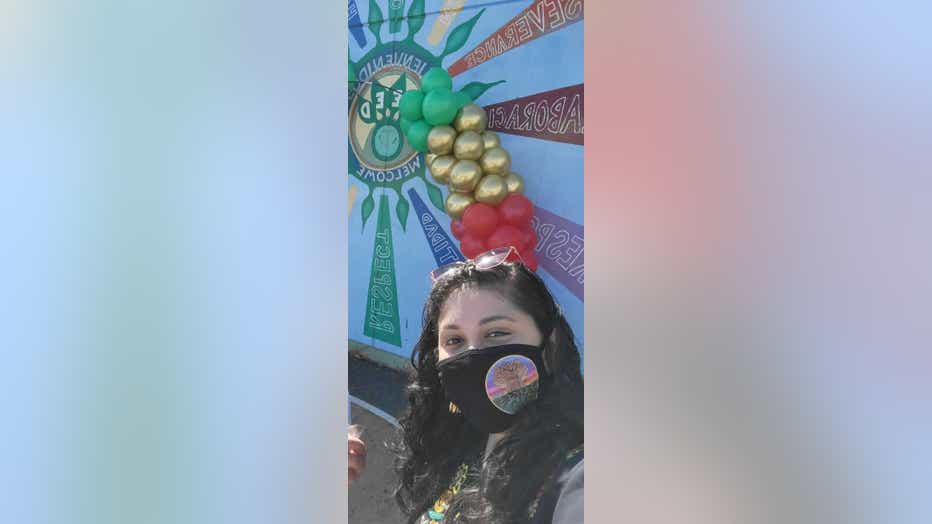
Mayra Alvarado is a 5th-grade teacher at Oakland's Manzanita SEED Elementary School.
Mayra Alvarado
5th-grade teacher Manzanita SEED Dual Language Immersion Elementary School
Oakland
"I learned a lot," said Mayra Alvarado, a 5th-grade teacher at Oakland’s Manzanita SEED Dual Language Immersion Elementary School. "I think I’ve grown as a teacher."
She said that getting to know the families of her students was important before but became even more so this year with the pandemic. There were all sorts of issues she had to deal with, from helping her families get computers to free food.
She also had to become a lot more flexible with her teaching style.
"I only knew how to teach in person," she said. "And then I had to teach online, while also having to differentiate my lessons for students who needed the extra support."
She said her students grew too. One of them told her that they learned a lot of self-management skills such as getting started on their own without their parents and how valuable that skill will be in middle school.
As for wanting to repeat the school year in distance learning?
"No, probably not," she said.
As for reopening, Alvarado said: "I really wonder what reopening will look like."
Since 5th graders aren’t eligible for the vaccine, she said she is going to continue wearing a mask.
"I want to make sure that the most vulnerable are protected and my students can’t get it even if the possibility is very low," she said.

Xin Huang, 19, graduates Oakland Tech in May 2021. The senior's father lost his job and had a stroke during COVID. She said remote learning was very hard.
Xin Huang
Oakland Tech high school senior
Oakland
Xin Huang, 19, a student at Oakland Technical High School, said her senior year was very hard.
"During your senior year, you need lots of help, not only with school but with scholarships and other college stuff," she said. "It’s hard when you’re not in person, especially if you don’t speak English. It’s really hard to read understand all these emails and understand what they’re saying."
Huang’s dad lost his job during COVID and also suffered a stroke. The teen was left to care for both him and her grandmother while also attending classes.
Learning at home made it difficult for her to concentrate.
"When I was at home taking care of my dad and grandma, it was hard to focus on learning," she said. "I’d be in class and suddenly, my dad was calling me."
As for resuming back to a state of normal, Huang said that she feels June 15 is too soon to stop wearing masks.
"Since it’s summer break, we should continue wearing masks until August or September," she said.
As for her plans for fall?
Huang still hasn’t heard if she’s been accepted to UC Berkeley, so if her dream doesn’t come through, she will attend UC Davis as a data science major.
MORE: Heartache and hope: How COVID-19 shaped college essays of 2020
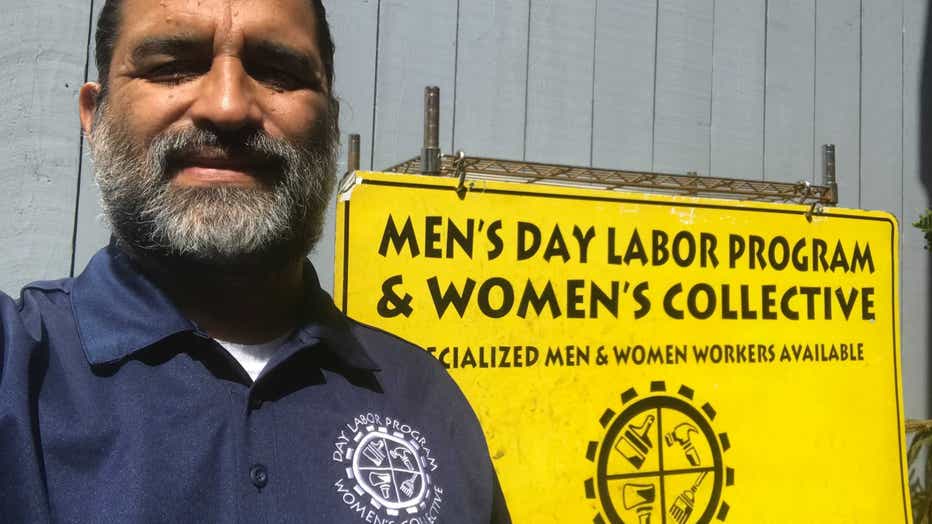
Francisco Herrera, co-director of the San Francisco Day Labor Program and Women's Collective
Francisco Herrera
Co-director of the San Francisco Day Labor Program and Women's Collective
San Francisco
Francisco Herrera, co-director of the San Francisco Day Labor Program and Women’s Collective, said the year has ranged from "extremely challenging" to "horrific."
His nonprofit matches day laborers and domestic workers, most of whom are undocumented immigrants, with San Francisco residents who need jobs done around the home.
During the shelter-in-place, no one wanted a gardener or a housecleaner working in or around their home because of the fear of transmitting COVID.
"People lost everything," he said, "their sources of income."
And while U.S. citizens were eligible for federal aid and unemployment checks during the pandemic, undocumented immigrants were not.
Plus, people died of the deadly virus.
A total of six day laborers in the program died of either COVID or another illness. And almost everyone in the community had a relative who got sick or died of the disease.
"We had real losses," Herrera said.
In his own family, he lost his mother and his father-in-law. And his son’s father-in-law also died.
Still, he said that the immigrant community never lost hope or kept working. His own nonprofit started partnering with other organizations in the Latino Task Force, to start providing better outreach and social services to homeless immigrants. Along with Calle24 and the Dolores Street Community Services, the groups were able to set up a common eating area on Capp and 24th streets where day laborers and other neighbors could eat safely outdoors.
Now that the state is opening up, the mood is definitely lifting.
"We’re now feeling very good," Herrera said. "Day laborers and domestic workers are feeling there is a sense of opportunity."
SEE ALSO: 'I hope for more work:' Undocumented immigrants thrilled to find jobs amid pandemic
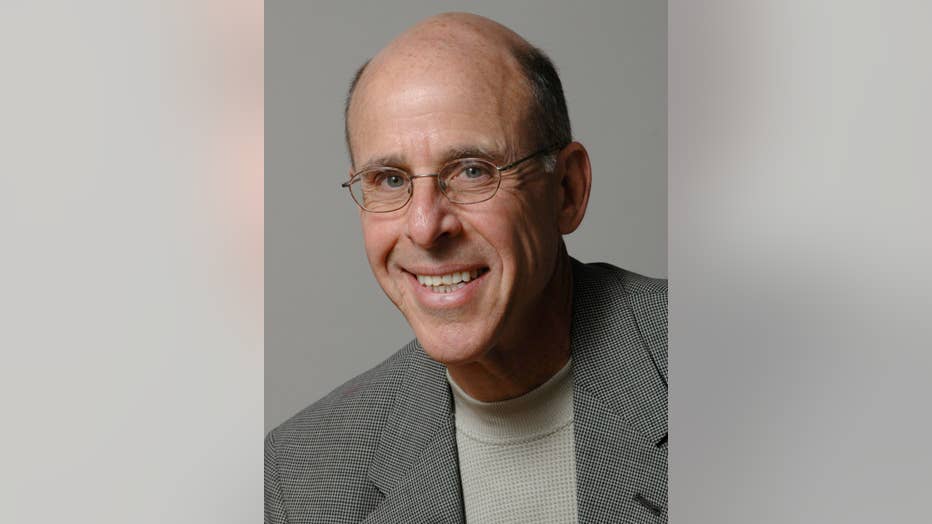
Dr. John Swartzberg, UC Berkeley professor emeritus of infectious diseases and vaccinology. Photo: UC Berkeley
Dr. John Swartzberg
UC Berkeley professor emeritus of infectious diseases and vaccinology
Berkeley
"I learned humility," Dr. John Swartzberg, UC Berkeley professor emeritus of infectious diseases and vaccinology, said of the trials and tribulations of living through a global pandemic.
"I’ve been a physician and a professor for decades," he added. "But this year, I learned an enormous amount about infectious diseases, and how little we really do understand."
Swartzberg also said that while he always had an enormous appreciation for science and learning, "that appreciation has burgeoned. What science has given us in a really short period of time facing an unknown foe, has been nothing short of miraculous."
He said he also learned something about American culture and the pursuit of individualism.
"Sometimes taking the individual bent is helpful," he said. "But cooperating and caring for our fellow human is even more important, especially during a pandemic."
As for the state reopening, Swartzberg said he’s very excited because he never thought that the U.S. would be in such good shape at such an early date.
However, he cautioned that "we should hurry, slowly."
While the United States is doing well, others across the world aren’t.
"We should open up, but open up cautiously," he said.
RELATED: Thousands at Oakland Coliseum received wrong vaccine dosage, medical staff say
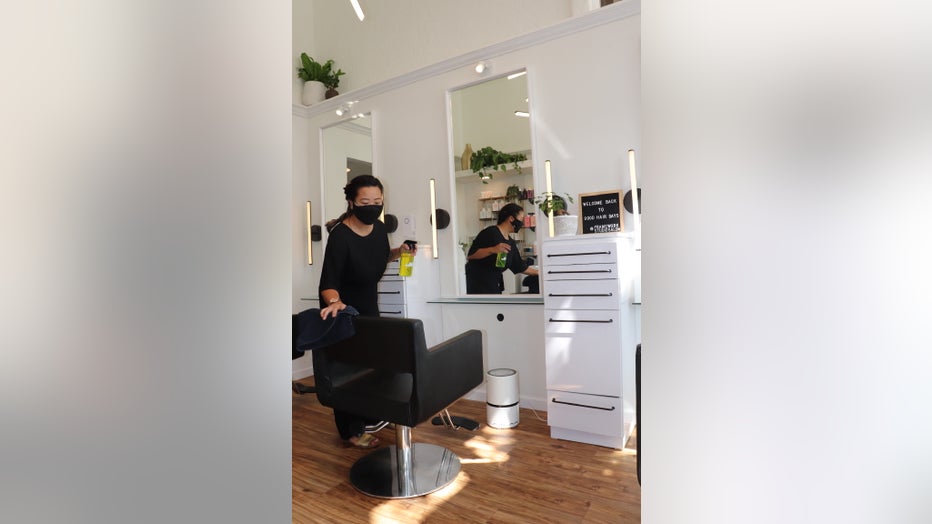
Cecilia Bada, a stylist and co-owner of Framework Studio Salon in Oakland, disinfects chairs between clients.
Cecilia Bada
Co-owner of Framework Salon
Oakland
"It was like riding a roller coaster of emotions being told to shut down and then we could reopen and then shut down again and then reopen again often with only a day's notice," said Cecilia Bada, co-owner of Framework Salon in Oakland.
Bada had to think outside of the box and looked for ways to offer services, even when she could not work with her clients face to face.
"With the first shutdown from March-September, I sold a couple of tint touch-up kits for my clients so they could cover up their grays and sold a little retail products to generate income. I also did a virtual bang trim tutorial for clients," Bada recalled from the early days of the pandemic.
And as a mother of two young kids, trying to figure out childcare while trying to navigate work amid the unknown was extremely challenging.
"I was left with a lot of uncertainty with rescheduling clients and unsure of who would watch my kids if/when I had to go back to work," Bada said. "Often I could only work on my business during their naps or at night when they went to sleep."
And even when restrictions began to ease a bit and stylists were moving shop outdoors, Bada and her partners decided that model was not a viable option for them.
"We opted not to open up outside since the cost to get permitted and everything would cost more than we would probably make," Bada said, noting that other factors, not the least, the dangerous air quality last September, due to the California wildfires, made it even more evident that operating outdoors would not be an option. "Between the fires and the smoke outside and having a restaurant doing outdoor dining next to us, cutting hair outside the salon was just not an ideal situation for us."
When Framework was finally able to open, there were major changes to how they operated, including vastly limiting capacity, implementing thorough disinfecting and cleaning practices between clients and enforcing mask mandates. She found there were some upsides to the new way of working. "When we reopened I booked longer appointments for my clients to have extra time to disinfect between people. I would say it has been nice to limit capacity to ensure not feeling rushed between having clients back to back."
Were there silver linings along the way?
"While it was definitely challenging not being able to work, the biggest silver lining was that this was the most time I have had at home with my kids since they’ve been born," the mother said. She also noted how grateful she was for the support and acknowledgment she received from her clients.
"I definitely felt the appreciation our clients had for us as hairstylists," Bada said. "There were many times I heard from clients, ‘you guys are essential’ and it was refreshing to see the value in our profession to provide self care and how necessary the beauty industry is for maintaining us on the outside but also to uplift us on the inside."
RELATED: Salon owners play waiting game, brace for another shutdown
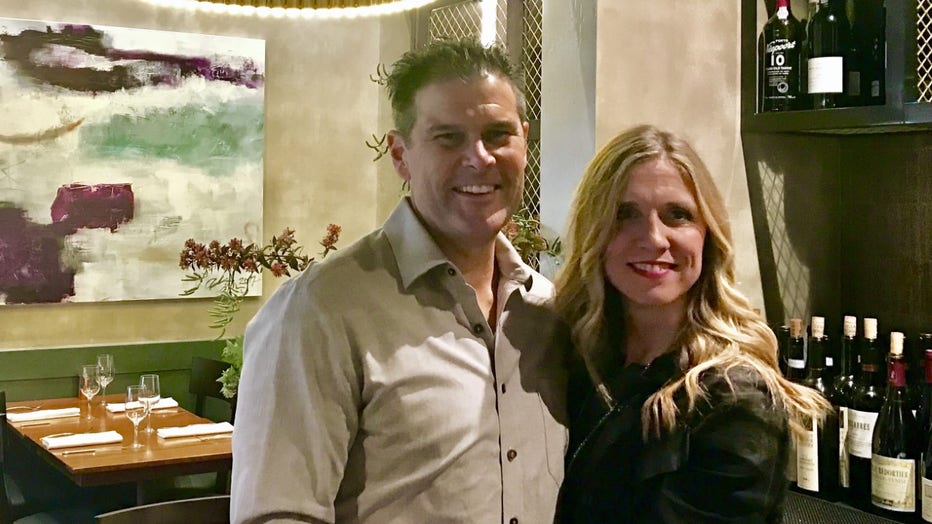
Rebekah and Rich Wood, owners of Wood Tavern, Southie, and The Wolf. Rebekah Wood recalls the many changes they had to make to their business model to keep their doors open over the past 15 months. (Rebekah Wood)
Rebekah Wood
Co-owner of Wood Tavern, Southie, The Wolf
Oakland
"It has been a turbulent year and we certainly, like many others had to hold on tight and ride the bull," said Rebekah Wood, co-owner of the Wood Tavern, Southie and The Wolf restaurants in Oakland.
And like almost every aspect of life, there was a lot of pivoting, readjusting and reinventing.
"It was super challenging to be a business owner of a restaurant during the pandemic," Wood said, giving much praise to her husband who also happens to be her business partner, who took the reins as she tended to their three grade-school aged kids. "While Dad went to shop to keep the business afloat, I was in a state of shock trying to wrap my entire being around how to keep them nourished and stimulated 24/7."
At one point, last year, she said she attempted to home school the kids at The Wolf restaurant on Piedmont Avenue when they were forced to temporarily close the site, the only of the Woods' three restaurants that had to close during the pandemic.
"Thank goodness for my husband that he did not have to shutter our College Avenue businesses," she said. "We went from an almost entirely dine-in business at Wood Tavern, to a completely to-go concept that Monday the 16th of March, 2020." The next big change was to merge the two concepts of their College Avenue sites in an effort "to operate more efficiently and utilize the staff and resources to the best of our ability."
As part of the change, "a quick, affordable, delicious tacos, burritos menu was introduced and currently, the space is called Southie Tacos," Wood explained. "I get many questions about why, but I don’t know what to say, ‘because, why not?"
Once summer arrived last year and outside dining became an option, there were more changes and adjustments as they reestablished the businesses under the new circumstances. "…we were able to open up on the terrace at the Wolf, and we had been working on building a solid, approachable to-go menu concept," the restaurateur said, "And if you look closely you can see that it was rebranded and says re-est 2020 on the sign."
While the Woods adjusted and took the necessary steps to stay open, none of it was easy.
"It was so difficult to lose our business model and way of doing business overnight," Rebekah said. "We had to let go of most of our staff, as we had no idea what was in store in the future. That was stressful and hard."
Overwhelming community support fueled them and helped keep them going.
"The pandemic brought out a lot of grateful people, those in the community that often shared they were supporting us, so that they could still have us when this was all over," Wood said. "That was always wonderful to hear."
RELATED: Struggling Bay Area restaurants find creative ways to survive
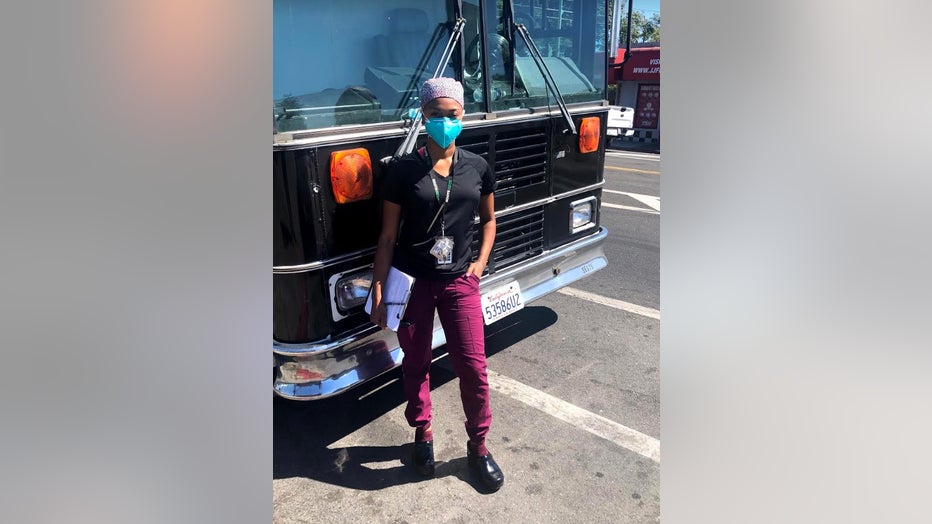
Maggie McNair, a registered nurse and patient care coordinator at Roots Community Health Center, photographed out in the field.
Maggie McNair
RN, patient care coordinator at Roots Community Health Center
Oakland
Last July —right in the thick of the COVID-19 pandemic, Maggie McNair decided to exit her job at an outpatient dialysis clinic, trading in her work badge for one that put her on the frontlines of the crisis.
"I was pretty much begging to be thrown into the middle of things," McNair recalled. "I was in a completely different area of nursing when I was working at a chronic dialysis outpatient facility, but things changed for me drastically."
The registered nurse started a new role at Roots Community Health Center, joining the street outreach team where she works in close proximity to possible COVID cases.
"When my team is notified of outbreaks in homeless encampments around the Bay Area, we go there. We do everything COVID-related, from testing to vaccinations for that community which is at higher risk for infection," McNair said.
With congregate settings like homeless encampments, can serve as breeding grounds for the virus. Homelessness in the face of COVID is like a crisis on top of a crisis. Experts say some of the best possible solutions are expanding outreach services to unsheltered people and housing assistance.
"My team acts based on the clients' needs, so whatever can be done to address the health emergency is paramount," McNair said. "And you want to act quickly, especially during a pandemic."
McNair and her team are also tasked with finding indoor accommodations for their unhoused patients, such as emergency shelters and hotels.
"Getting our high-risk clients off the streets is key, so those people ages 55 and up and those with chronic diseases," McNair said. "And some of those connected with temporary shelters found permanent housing, which is huge."
The young nurse has no regrets about shifting gears and transitioning into a different nursing career path.
"You can't get by playing it safe," she said. "It's been very fulfilling being able to serve my community during such a crazy time. When I look back, I know I'll be grateful that I was in the thick of it."
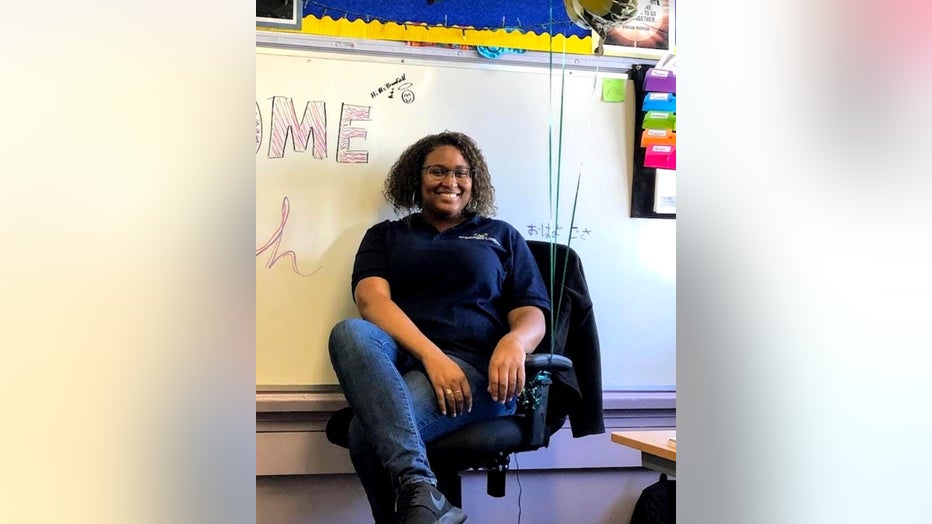
Aliyah Brumfield, an eighth-grade teacher at Aspire Berkley Maynard Academy, photographed pre-pandemic inside her classroom.
Aliyah Brumfield
8th-grade teacher at Aspire Berkley Maynard Academy
Oakland
"My job was challenging, a roller coaster during the pandemic."
Before COVID hit, Aliyah Brumfield says her workday was routine. But like most Americans, that normalcy was drastically altered in March of 2020.
"Work was more manageable pre-COVID. It was more contained and consistent and I was more organized," she remembers.
There was no rule book out there on getting through COVID, and it brought plenty of challenges to traditional workplace settings. Brumfield quickly learned that in order to provide her students with the quality education they deserved she would have to bob and weave her way through the pandemic.
One of the biggest obstacles she faced early on was "making sure all my students had the access to technology for distance learning."
"At school, we shared technology, but when the pandemic struck, we had to find ways to safely get the technology to the students, and we have students all over the Bay Area," she explained..
She said that at the start of the pandemic, she knew America would be in it for the long haul.
"I made the quick switch from a paper-based curriculum to one fully online," Brumfield said.
And some of her 8th-grade students adjusted well to remote earning and thrived.
"A few of my students who were struggling before that pandemic, were more productive when we made the switch to online learning," she said. "I think they were more comfortable asking for help and they were already used to being online for everything in this digital age. Some students that had the fear of speaking up in the classroom, didn't really have that at home."
But other wrestled with distance learning.
"Maybe they couldn't focus in their household and missed part of the lesson," Brumfield said. "Or they flourished in the classroom, but weren't as engaged at home because they didn't want to sit behind a computer screen for eight hours listening to someone."
The pandemic stirred a variety of emotions and feelings within just about everyone.
"It felt like I was living the same day over and over day again. I couldn't differentiate work from personal life sometimes. It was very lonely at times for me because I live alone," she said.
COVID threw a curveball like never before and as the pandemic comes to an end, Brumfield says she now realizes there was a blessing in the struggle.
"The pandemic was a roller coaster of emotions, but also eye-opening. During that time alone, I got a chance to really reflect and work on myself personally and professionally," she said.
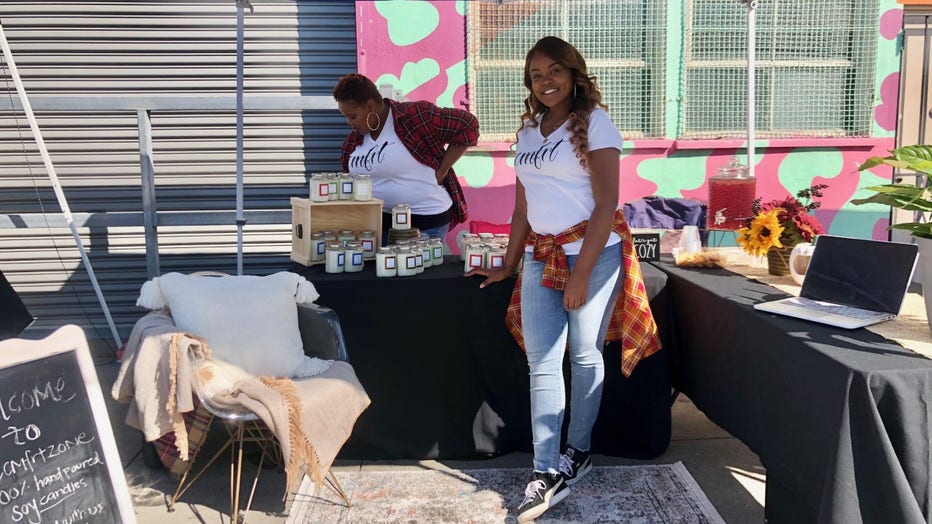
Tahje Washington, owner of the Comfort Zone, had to pivot after transitioning from her job in the tech industry during the pandemic.
Tahje Washington
Owner of The CMFRT Zone
Oakland
For Tahje Washington, she was forced to master the pandemic pivot after her contract as a human resource specialist at Google expired in October.
"During my contract, I had high hopes that it would convert over, but there wasn't the opportunity," Washington recalls. "Though I had an actual end date so I was able to mentally prepare for my departure."
And prepare herself she did, sticking to a strict budget and saving enough to keep her afloat while she looked for work.
"It was kind of scary you know, worrying about health care benefits and the repercussions of losing them," she said. "Adulting hit me face first."
Refusing to swim in the sea of pandemic guilt, she established a new daily routine to help her bounce back.
"It was hard the first month because I was so used to waking up on someone else's schedule, but being out of work I knew I didn't want to slip into any bad habits," she said. "So I had to get strict about being productive."
By creating healthy habits and making over her mindset, Washington said it "came with a sense of peace, me not being in the rat race, and having time to explore my hobbies."
Before the pandemic, she developed a business plan for an online candle shop, The CMFRT Zone, but with work, she couldn't devote all of her attention to the project. That wasn't until her stint at Google came to an end.
"I hadn't revisited my business plan in a while and I knew it would be a valuable time to do so, plus I needed to hustle" she recollects.
Stress brought on by the pandemic sabotaged people's motivation and productivity, but for some, they found their spark.
Washington went to work, getting her online candle shop up and running. Operating as a one-woman army, she handles the day-to-day operations for her small business, from making the hand-poured sox candles, to marketing and promotions, she touches it.
"My company's motto is 'to find comfort in the chaos. I said that before the pandemic hit, and it's so crazy where we are," she said retrospectively.
Washington is not completely abandoning the tech sector and is open to reentering the workforce.
"Putting in applications is daunting, but I do believe the corporate space will teach me how to run my business. I still have wanted to climb the corporate ladder," she says.

